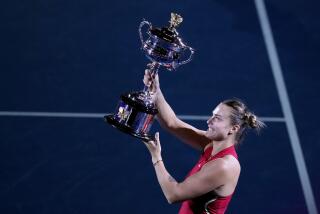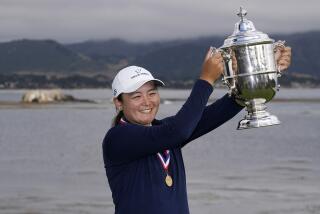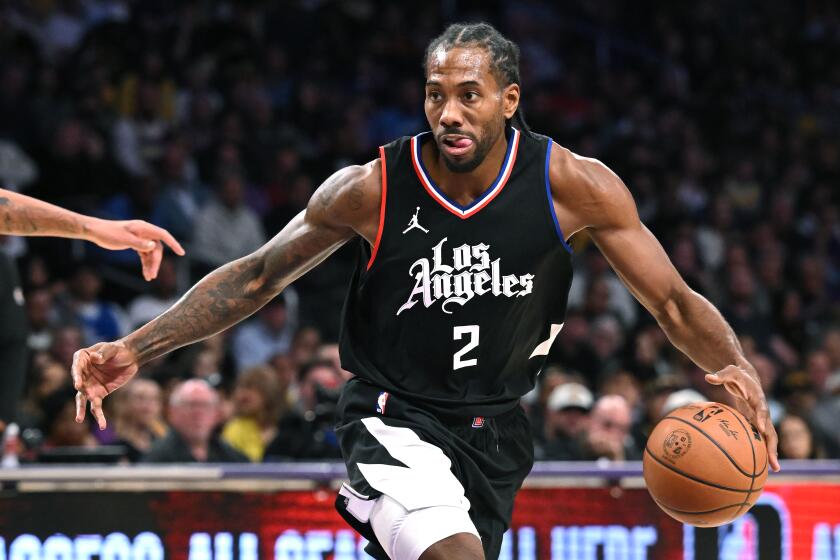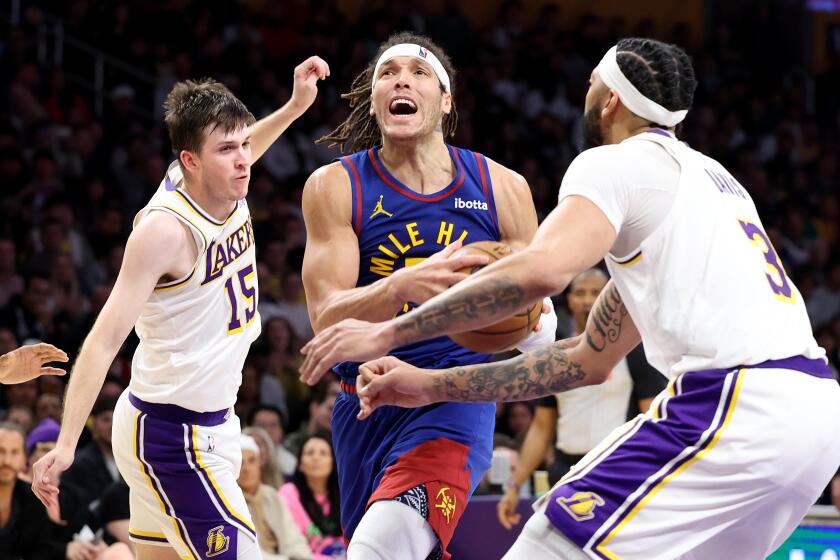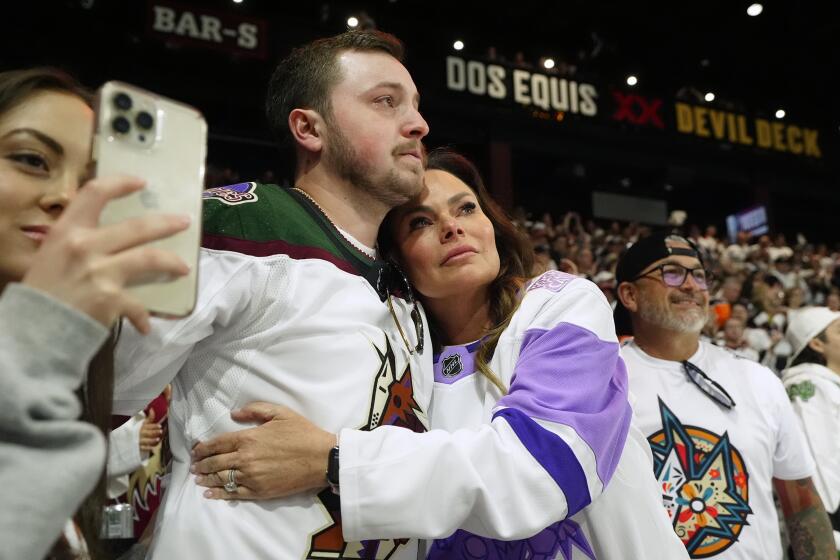Maria Sharapova rallies for second-round win at U.S. Open
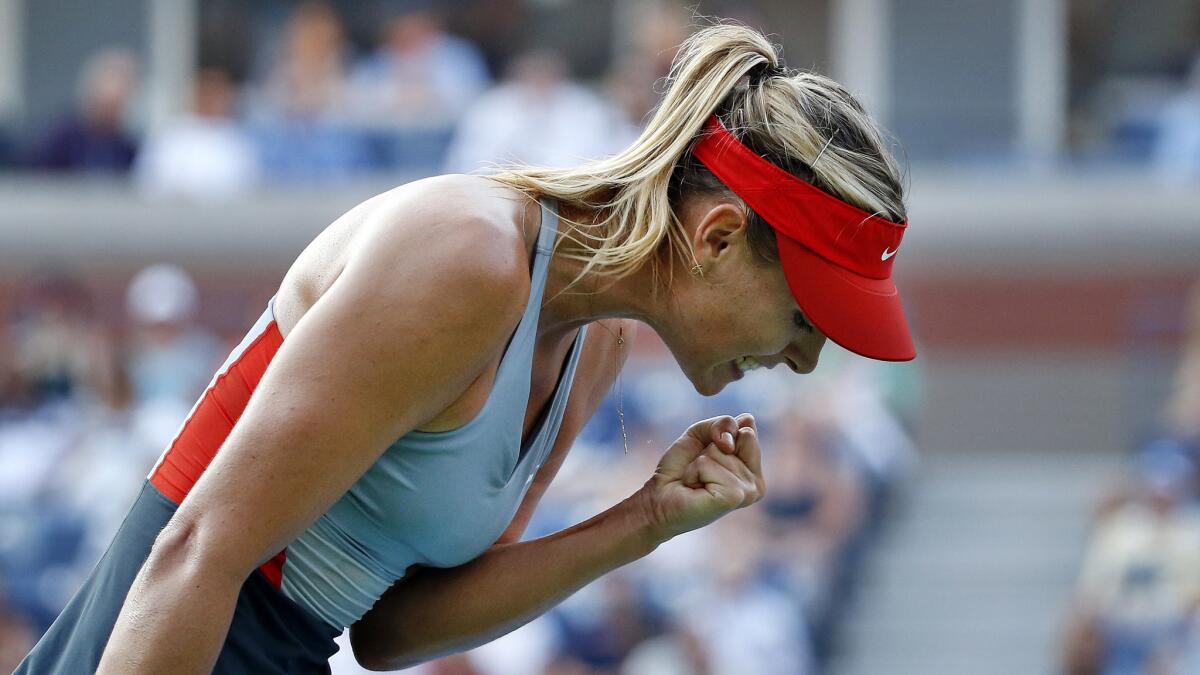
Maria Sharapova is a hugely talented tennis player and the queen of quirkiness. Also of perseverance.
Both latter attributes were greatly in evidence Wednesday in her second-round victory at the U.S. Open, where she beat Alexandra Dulgheru of Romania, 4-6, 6-3, 6-2.
The match took 2 hours 38 minutes. It included 46 unforced errors and nine double faults from Sharapova, who made up for those by hitting 34 winners. Dulgheru, ranked 96th, made 36 unforced errors of her own and had 14 winners.
Even when Sharapova lost the first set, there was entertainment value in the inevitability that she would win. That’s based on more than just her No. 6 world ranking or No. 5 seeding here; also on more than she is one of only a handful of players ever to win every major title at least once — the French twice.
Her season had already included 16 three-set victories, so it has become almost part of her rhythm.
Asked about that afterward, she said it indicated that she was in great physical shape, but that a few more two-setters “would make my life a lot easier.”
Perhaps more interesting than Sharapova’s winning yet another three-setter was watching how she did it. If there were a school for the study of superstition, she could write the textbook.
It begins when she takes the court before every game. There is no stepping on the lines.
Before each point, serving or receiving, she turns her back to the net and has a quiet chat. Maria advises Maria.
If she is serving, she comes to a full posture stop, then bounces the ball, delicately, twice. Never once, never three times. If something disrupts the rhythm, or the receiver steps back, she begins the routine again. Two bounces. Only two.
If she is receiving, the point-by-point routine starts with a little jog in place, then a quick forehand and backhand practice swing. When the server is about to start her motion, Sharapova clenches her left fist tightly, then unclenches it and gently slaps her left thigh twice. Never once or three times. Twice.
“I’ve had my routine for a long time,” she said afterward. “Everything is very quick. You go from point to point. You are playing in front of thousands of people, so sometimes, it’s nice to have a little bit of quiet moment with yourself. That’s the reason I started doing it. You need a little pick-me-up.”
And then, of course, there is the screeching on every stroke. After a while, you either get used to it or get a headache and leave, but it is all part of her doing it her way. The matches may sometimes feel like a college lecture class in soil erosion, but there is no arguing with her success.
She said she lost the first set when she didn’t make the best of her chances to go up 3-0. But she never looked back, and kept grinding through sunshine and into the early evening, through late-afternoon heat and early-evening swirling wind.
At the moment, happy and healthy — as opposed to last year at this time when she couldn’t play because of a shoulder injury — she said she never doubted.
“I felt I was physically stronger all day,” she said.
Venus wins
Venus Williams continued her comeback year with a 6-1, 6-4 victory over Timea Bacsinsky of Switzerland.
The day began with No. 5 Agnieszka Radwanska of Poland, who seems to struggle in major tournaments, losing to No. 39 Peng Shuai of China, 6-3, 6-4.
That was followed quickly by U.S. hope Sloane Stephens, seeded 21st, going out to No. 96 Johanna Larrson of Sweden, 5-7, 6-4, 6-2. Afterward, Stephens stonewalled most of the questions from the media and said, repeatedly, that she “didn’t want to dwell” on the loss.
No. 2 Simona Halep of Romania, taken to three sets in the first round, cruised this time, beating Jana Cepelova of Slovakia, 6-2, 6-1.
Sweet 15
Tuesday’s 15-year-old sensation, Catherine (Ci Ci) Bellis of Atherton, Calif., will next play No. 48 Zarina Diyas of Kazakhstan. When Bellis won her first match, she became the youngest U.S. player to win a U.S. Open match in 28 years and the youngest to win a match here since Anna Kournikova in 1996.
Bellis carries a ranking of No. 1,208 and got into the Open by winning the USTA’s Girls’ 18 event at San Diego.
Berdych ousts Hewitt
No. 6 Tomas Berdych’s 6-3, 6-4, 6-3 victory on Arthur Ashe Court highlighted a light day on the men’s side. Berdych beat former No. 1 Lleyton Hewitt, the 33-year-old Aussie who won the U.S. Open in 2001.
Two-time NCAA champion Steve Johnson of USC, had a two-sets-to-one lead over Tatsuma Ito of Japan when he had to retire with cramps.
“If I could have walked, I’d still be out there,” a disappointed Johnson said.
Oh, my!
Broadcaster Dick Enberg, who for years called the main matches at the U.S. Open for CBS, will do one more here on the final Sunday. The network, which is losing the U.S. Open broadcast rights to ESPN next year, wanted to honor Enberg, 79, by giving him one more call. The regular San Diego Padres play-by-play man will miss calling several baseball games to make the trip.
More to Read
Get our high school sports newsletter
Prep Rally is devoted to the SoCal high school sports experience, bringing you scores, stories and a behind-the-scenes look at what makes prep sports so popular.
You may occasionally receive promotional content from the Los Angeles Times.
